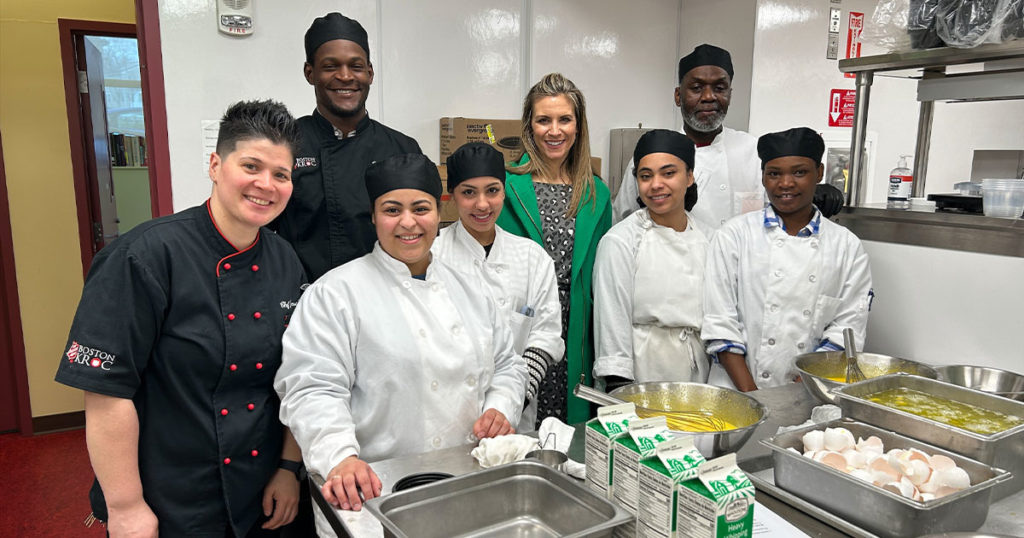Transforming Lives One Plate at a Time
Chef Jesse Perez is empowering future chefs through faith and flavor.
In the heart of Dorchester and Roxbury, The Salvation Army’s Boston Kroc Center is using food as a force for change. Its 10-week Culinary Arts Training Program equips aspiring chefs with hands-on skills, confidence, and a strong sense of community. At the helm is Chef Jesse Perez, whose blend of expertise, compassion and faith guides students toward real-world success in the kitchen. The War Cry sat down with Chef Perez to explore the program’s vision, the challenges students face, and the powerful transformation taking place — one plate at a time.
As you lead this new culinary program, what’s your approach to creating a supportive and purpose-driven environment from day one?
We receive a lot of applications and meet personally with each candidate. Every student pays a small fee that covers their materials, and we begin with a week of orientation to help them settle in. From the very beginning, we focus on community. These students aren’t just here to learn how to cook — they are here to grow as individuals. My job is to walk alongside them on that journey.
You’ve said that growth in the kitchen takes patience. Why is it so important to embrace mistakes as part of the learning process?
Be patient with yourself. People often expect to get everything on the first try. But learning takes time. Mistakes are where the real growth happens. Whether you’re in a professional kitchen or cooking at home, it’s important to enjoy the process — not just the outcome.
What are some common barriers students face in the kitchen, and how do you help break through those challenges?
Rushing is a big one — people skip steps and lose focus. Safety is also crucial, so we make sure everyone’s trained and equipped. Many students come in unsure of themselves. We work on building them up, one dish at a time.
What tools do you believe every beginner should invest in to build a strong foundation?
A high-quality chef’s knife is essential for precision. For those who enjoy baking, reliable measuring tools and a good mixer make a big difference. The right tools can turn a simple dish into something truly special, and they give people the confidence to keep creating.
How do daily routines in the classroom reflect the real-world demands of a professional kitchen?
We start with a check-in, then go over the recipe of the day. Students work in teams, which helps build communication and time management. After tasting and evaluating what they’ve made, we clean up and prep for the next day. It mirrors the rhythm and discipline of a real kitchen.
For people learning at home, how can they build confidence and improve their cooking without formal training?
Cooking is a skill, and like anything else, it gets better with practice. Watch videos, read recipes, and don’t be afraid to experiment. Mistakes are part of the learning process.
Career readiness is part of your mission. What kind of support do students receive as they prepare to enter the food industry?
We partner with local restaurants and hotels, and I receive job postings regularly. Our students also work with a life coach who helps with résumés and interview prep. It’s all about building confidence and making sure they’re truly ready to step into a new role.
Sustainability is a cornerstone of the program. How do you teach students to be resourceful, and how can home cooks apply those same principles?
We teach students how to reduce waste and use what they already have. That might mean shopping at farmers’ markets, using leftover ingredients creatively or re-purposing food in smart ways.
Balancing flavors can feel like a mystery to new cooks. How do you help students develop their palate and intuition?
I guide students to taste everything as they go. We talk about how flavors interact and how to adjust along the way. With time, they learn to trust their instincts. Confidence in seasoning grows just like any other skill — with practice and patience.
Your own story is one of perseverance. How does your background inspire the way you teach and connect with students?
My family came to Boston in 1995 with very little. My mother’s determination inspired me. I started working with The Salvation Army in 2011 and worked my way up. I’ve faced challenges, and see those same struggles in our students. That connection fuels my desire to help them succeed.
Is there a Bible verse that guides your work and your purpose in this program?
Philippians 4:13 (NKJV) — “I can do all things through Christ who strengthens me.” That verse has been with me through every stage of life. I know God put me here for a reason, and I trust Him to guide me in this mission every day.
Witness a life-changing journey from the Boston Kroc Culinary Program at bit.ly/4cHIVET.







